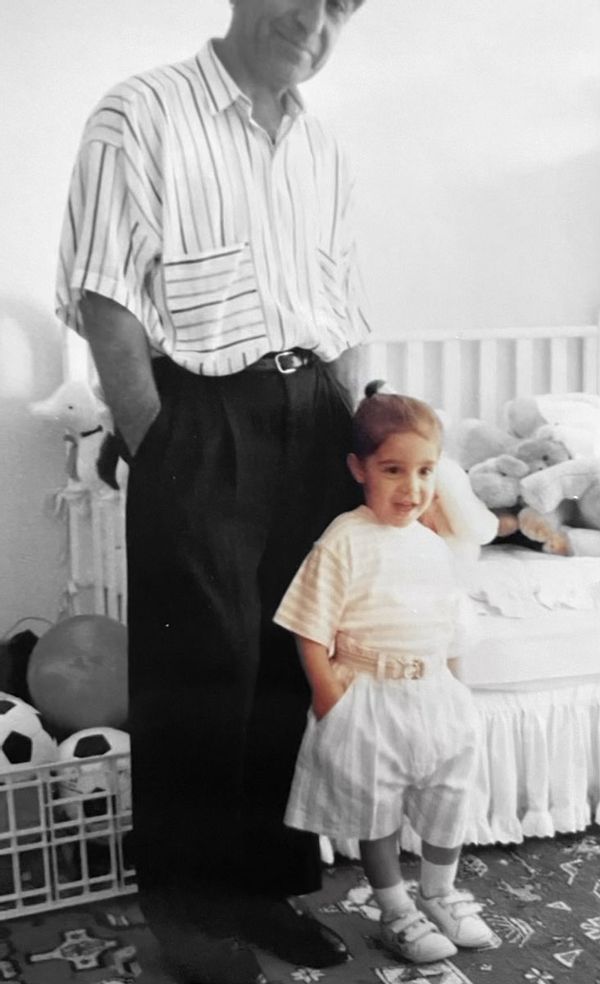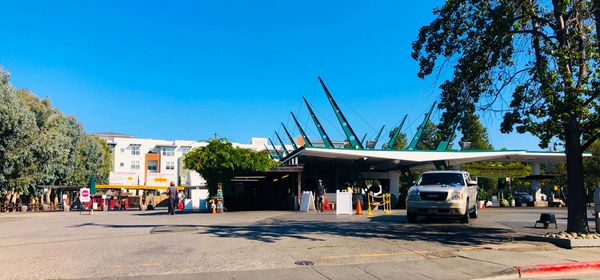
Every year on the day my father died, I get my car washed at a beloved Bay Area spot. Turning off El Camino Real in Mountain View, I pull into Lozano Brushless Car Wash. When we used to enter the forest green girders of this mid-century modern space-agey car wash, my father was present, wholly mine for a magical half hour.
As an adult, I kept this ritual: I drive up to the attendant and ask for a full-service wash and vacuum. She hands me a ticket and while I wait for the row of cars ahead, my muscle memory takes over: roll up the windows, cram any loose bobby pins and pens into my purse, check the windows again, pop the trunk. I turn off the radio blaring the classic oldies my father used to play when he was the driver and I his joyful passenger, trusting of wherever he would take me.
After relinquishing my keys, I walk to the pay station, grabbing a coupon from the cracked plastic brochure holder that’s been there since my father began bringing me here when I was a small child. He had been going for decades — the business opened in Mountain View in 1957, a few years before he arrived in California at the age of 17 from northern Iraq.
While in line to pay, I watch children take turns on the coin-operated Sandy horse. “Ride the Champion 1 ¢” reads the turquoise sign under the peeling chestnut lacquer of the hooves. This was my original ride, a vehicle of my childhood imagination that could carry me anywhere I wanted to go.
In the early 1990s, my father owned a car dealership, and when anyone asked him where to clean their cars, this is where he sent them. They’ll never ruin your paint, he’d proclaim in that charming way he had of stating opinions as facts.
In the partially enclosed waiting area, parents stand on both sides of me, hoisting their kids onto their shoulders to watch the cars glide through the tracks of swishing cloth towers. I remember the way my father would teach me about different cars as they emerged through that dark tunnel. The makes, the models, the mufflers that could furnish even the junkiest car with an impressive sound — how every detail felt like a secret he was revealing just to me, his only child.
Coming to Lozano’s was our weekend ritual for much of my childhood, before my father abruptly shut down his dealership and became a different sort of businessman — a “financial consultant,” he told me. I didn’t know what that meant except that he wasn't around as much anymore. He left for Europe on a business venture when I was seven years old, and I sobbed under my covers for hours after we dropped him off at the airport. Almost every morning he was gone, we talked briefly on the phone after I read the newspaper comic strips, and I would ask him when he was coming home. He always said, “soon.”
It took me a year to realize he was lying to me, and it took him two years to come back — for a little while, anyway, before he began traveling again. Whenever he was gone, the car would get washed in our driveway, where my mom used a single bucket of warm, soapy water, a bottle of glass cleaner, a squeegee, and faded cotton T-shirts to wipe the streaks away, narrating each step along the way.

Passing through the waiting area, I see families crowded around the retro red popcorn wagon. They fill those crinkly carnival bags with buttery kernels and pour lemonade into small Dixie cups. Even without drinking the phosphorescent liquid, I can taste the sweetness of the artificial syrup I once savored. By the time my 2007 Mercury Milan emerges into the light, my eyes are full of tears. The air is heavy with the smell of soap and cleaning sprays, and I walk outside to where my shiny sedan is being wiped down and dried by two attendants. I thank them and hand each the cash tips that were folded in my back pocket, just as my father had taught me.
For a while, I had stopped going to Lozano’s after sharing the recommendation with a friend and an online review led me to a local news article about some trouble there. I remember my heart sinking when I read that the U.S. Department of Labor reported that the car wash was cheating workers of their wages on slow business days, forcing the business to provide back pay to 270 workers who had labored there between 2006 and 2008.
“Your car is so filthy it looks stolen,” my father mumbled to me repeatedly during his final visit in 2013, when he returned to the Bay Area so I could take care of him through cycles of chemo and radiation. Before he was diagnosed with oral cancer, I barely saw him every few years as he continued his itinerant international quests. “Please go to Lozano’s,” he slurred. Ss and Zs were challenges for his reconstructed tongue.

And so, I started going back. It was only two blocks away from the Residence Inn where he stayed during his treatment. I would drive there sometimes after leaving my father tucked in bed, his shrinking five-foot-six-inch frame engulfed by an extra-large cotton T-shirt, baggy basketball shorts. The car wash was my escape to a place where it felt like nothing had changed, where I could re-imagine the father whom I chose to take care of even though he had abandoned me time and time again for reasons he could never honestly explain.
After he died, after I placed his ashes in the Pacific Ocean — where it could wash away his radiated mouth, his poisoned blood, the stench from the gaping hole stretched across his cheek after the last clinical trial, so deep I could see his jawbone — I would return to Lozano’s every July 24.
But Lozano’s isn’t Lozano’s anymore. On the Monday afternoon after Father’s Day this year, I drive up to an almost-empty lot. The trademark retro armature of the original Lozano's still stands, though painted a brighter Kelly green. Everything else is gone. In preparation for this July, the tenth anniversary of my father’s passing, I thought I would try the new automated wash that finally replaced Lozano’s after it closed a few years ago.
An attendant in black dress pants, a white short-sleeve button down, and a tie asks if I want the $10 or extra bells and whistles $15 wash. He swipes my credit card from the window and tells me I will stay in the vehicle for the entire wash, pointing me to the second attendant on my journey. “I used to come to Lozano’s all the time with my dad,” I start rambling out unconsciously as he nods at me, clearly the recipient of much nostalgia. The second attendant guides me onto the tracks, tells me to put my car in neutral, and waves me off.
For the next three minutes I submit myself to the automated wash. The world beyond my windows disappears as soapy water streams down the dash. I feel suffocated and claustrophobic, and my heart rate accelerates as the terry cloth towers batter my car from all sides, and I experience my deepest fear: a loss of control. I am not prone to panic attacks, but I’m on the verge of one as my brain begins imagining all the things that can go wrong in this sudsy storm surrounding me. Arcs of green and red lights flash as my car moves down the tunnel. Drying vents affixed to massive undulating columns blast air until every rivulet of water disappears.
When my car shifts off the tracks, and I switch into drive to exit the lot, my limbs continue to tremble. Nothing about that experience felt neutral. A new kind of grief washes over me. Not only for my father, but for the men and women with their drying rags and scented sprays, for the salty popcorn, for the connection I felt in that space, a space where past became present and present became past, a space I chose to love despite its flaws.
Like Lozano’s, only never held accountable, my father was shady in more ways than I can divulge in one essay, not the least of which was devouring my mother’s life savings and never paying her back, not even years later when they divorced and he finagled a way out of it without owing her a cent. Not the least of which was abandoning my mother both times she had cancer, leaving us to take care of each other — when I was only eight, and again when I was 14 — to pursue who knows what. There were stretches of time when I could barely look him in the eye, when I kept him at arm’s length to protect myself. But I loved him, too.
For years, I used to go to Lozano’s to feel close to my childhood. I used to go to Lozano’s for ablution. I used to go to Lozano’s to remember a time when I could be lifted onto my father’s shoulders without knowing what else they carried. Yet it feels right that the space has changed as much as my life has. I was 27 years old when my father died a decade ago. I know in my bones now that sometimes grief is as much a feeling as it is a place, and I will miss that car wash where sentiment and landscape collided.
However, I no longer need to visit Lozano’s every July 24 to bring back a simpler version of my father. I miss the tender dad who used to take me there, who cared for me in the small, splintered ways he could. But I cannot scrub away the sullied enigma who hurt me in the colossal, copious ways he did. Each of those fathers shaped me. Today, I remember them both.







